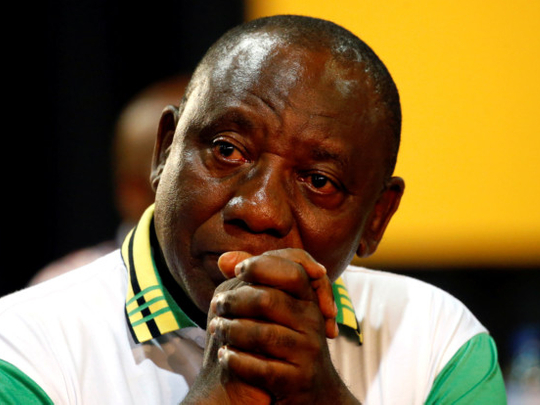
South Africa and its governing African National Congress (ANC) have been plunged into a constitutional crisis in a standoff between the party’s new leader, Cyril Ramaphosa, and the country’s President, Jacob Zuma, who refuses to resign. Zuma could face more than 700 charges of corruption, fraud and racketeering, which preceded his controversial presidency, along with new claims to be investigated under an inquiry set up last month to probe allegations of Zuma having allowed state resources to be used to enrich his friends, particularly the controversial Gupta family — which he and they deny.
Yet, as this power struggle continues, the longer it takes for Zuma to stand down, the more the authority, credibility and power of (and optimism for) Ramaphosa wanes. The longer Zuma stays, the more the chances of the ANC winning the 2019 elections deteriorate, along with Ramaphosa’s ambition of finally becoming South Africa’s president.
Under the scandal-prone Zuma, the ANC’s vote has dramatically declined, with the party losing major metropolitan areas in the 2016 municipal elections, including Johannesburg and Pretoria. And the longer Zuma stays in the presidency, the more his allies will grow in confidence and entrench their own grip on the party and government.
Unless Ramaphosa is seen to be in control, the risk is that even after Zuma departs, Ramaphosa’s authority may be so harmed that he may struggle to unite the divided factions in the ANC and the wider South Africa behind a common vision for growth, fighting corruption and improving failing public services.
Zuma has so far escaped facing any charges. Critics say he has achieved this by appointing pliable allies to security, police and prosecuting authorities. He desperately wants to end his term in 2019, ahead of South Africa’s next general election; this will presumably give him the power to finally quash all the investigations against him.
Zuma narrowly failed last year to secure his former wife, Nkosazana Dlamini-Zuma, the former African Union head, the ANC presidency, when she lost by under 200 votes. Dlamini-Zuma, if she’d become president, would presumably have protected him from prosecution.
Now Zuma is holding out for a deal that will grant him immunity from prosecution, similar to the one that Robert Mugabe received last year when he was ousted from the Zimbabwean presidency.
However, Zuma’s key problem is that immunity from prosecution is currently not possible in South African law. It is possible to give a presidential pardon, but only after a conviction. This means Zuma must first face the corruption charges and, when convicted, hope for a sympathetic national president.
Alternatively, South Africa’s constitution could be changed to provide for immunity for presidents. But this would need a two-thirds parliamentary majority, which the ANC does not have.
This week the annual state of the nation address was postponed for the first time since the end of apartheid, plunging government into paralysis — with the country’s budget possibly not being approved, putting public services at risk.
Yet, despite all this, Ramaphosa has a weak hand in his negotiations with Zuma, who knows the possibility of conviction followed by pardon would be extremely unlikely if Ramaphosa were president. Giving Zuma a free pass would promote a culture of impunity, in which Zuma’s minions would also demand immunity.
Ramaphosa’s narrow victory over Dlamini-Zuma has left the ANC’s new leadership structures evenly balanced, meaning that a backlash against firing Zuma could potentially see a 50-50 split in the ANC. Zuma has in the past threatened to form his own party if forced to do so.
Another difficulty for Ramaphosa is the unstated threat of violence and destabilisation by Zuma’s supporters, especially in the volatile KwaZulu Natal province, where the power struggle could be framed in terms of ethnicity, as a “Zulu” leader being forced out. Zuma’s supporters have shown in the past that they are prepared to use violence in his defence.
These are all reasons why Ramaphosa feels obliged to seek a negotiated exit solution. So if he’s to succeed, he will have to show the steely resolve he was once known for: So evident when he was a trade union leader during the apartheid era, and when he led the ANC’s negotiations to end apartheid.
He now needs to go for broke, to regain the impetus by firing Zuma promptly, to show who is in charge, even if that risks Zuma forming a breakaway party. If he fails to do so, the end result may be an outright ANC defeat in the 2019 elections, or a loss of its majority, which would allow the opposition parties to string together a governing coalition. Ramaphosa’s nightmare would be for such an outcome to mark 25 years since the end of apartheid.
— Guardian News & Media Ltd
William Gumede is an academic and author.










